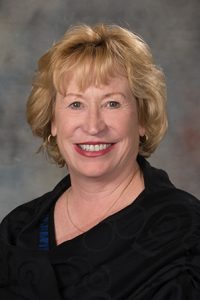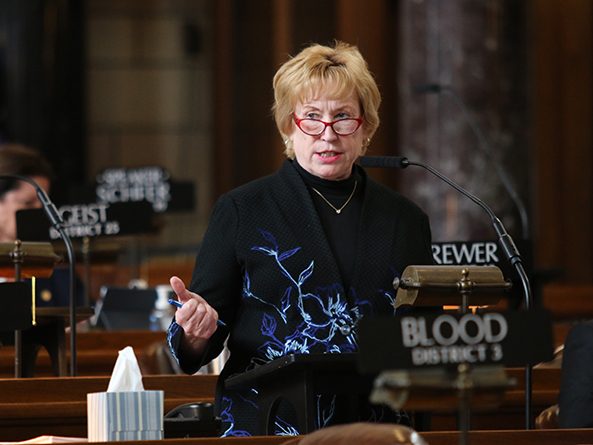Property tax relief through increased school funding debated
Lawmakers debated a proposal May 7 to reduce property taxes by raising the state sales tax rate and directing the additional revenue to Nebraska’s public schools.
Elkhorn Sen. Lou Ann Linehan, sponsor of LB289, said 166 of Nebraska’s 244 school districts receive little funding through the state’s school aid formula. Under the proposal—contained in a pending Revenue Committee amendment that would replace the bill—every school would receive at least a third of its funding from the state, she said.
This significant increase in aid would reduce the state’s overreliance on property taxes to fund K-12 education and provide “meaningful” property tax relief for every property owner in the state, Linehan said.
Revenue components
The proposal would be funded by an increase in the state sales tax rate from 5.5 to 6 percent beginning July 1, 2019. The amendment also would impose sales tax on bottled water, candy, soft drinks and ice and increase the tax on a package of cigarettes from 64 cents to $1.
The amendment also would impose taxes on approximately 20 services, including motor vehicle maintenance and repair; maintenance, painting and repair of single-family homes; commercial lawn care; dry cleaning; beauty and personal care services; wedding planning; personal training; and storage, moving, plumbing, HVAC and certain veterinary services.
Additionally, the amendment would repeal a personal property tax exemption and increase the tax on the transfer of title to real estate from $2.25 to $3.25 per $1,000 of value.
To offset the sales tax increase’s effect on low-income Nebraskans, Linehan said, the proposal would increase a state refundable income tax credit based on the federal earned income tax credit, which is intended to benefit working people with low to moderate incomes. The state credit would increase from 10 percent to 13 percent of the federal credit.
The amendment would direct the new tax revenue to the state’s property tax credit cash fund, which currently is funded at $224 million. The amendment would use a portion of the fund for school aid, but it also would require the Legislature to grant no less than $115 million in property tax credits each year.
School funding components
The proposal would make several changes to the state’s school funding formula, the Tax Equity and Educational Opportunities Support Act (TEEOSA).
Beginning with school fiscal year 2019-20, each local school system would receive foundation aid of at least $3,474 per student and up to $5,211 per student.
If total state aid through TEEOSA totaled less than 33.33 percent of a district’s total formula need, the district also would receive guaranteed funding aid to make up the difference.
The amendment would reduce the value of all property classes for school funding purposes and change school districts’ maximum levy. It also would limit increases in school funding from property taxes by an inflation rate based on the Consumer Price Index and a district’s real property growth.
North Platte Sen. Mike Groene, who supported the amendment, said limiting the annual increase in property taxes a school could collect is necessary to provide property tax relief through TEEOSA. The proposal would offset that loss in property taxing authority with additional state aid, he said.
Groene said the amendment is a more stable source of state aid for schools and treats each student equally.
“I did not come down here to raise taxes, and I truly believe LB289 does not raise our overall tax burden,” he said. “Rather, it creates fairness in our tax policy.”
Sen. Tom Briese of Albion also supported the amendment, saying the state must cover a greater share of the cost of public education if it is going to address high property taxes. Raising new tax revenue is the only way to pay for that additional aid, he said.
“There’s a lot to quibble about on this bill, but a lot of compromise and discussion went into this,” Briese said. “LB289 is the most viable, responsible and effective plan we have going here.”
Henderson Sen. Curt Friesen said he abstained when the Revenue Committee voted to advance LB289 with the amendment but that he would now support the proposal. Although it would provide $372 million in new revenue to schools, he said, the amendment would reduce property taxes for agricultural landowners by only 9 percent.
“We have to rely on different revenues than property taxes to fund our schools,” Friesen said, “but that does not mean we’re going to see a huge drop in the property tax loads.”
Lincoln Sen. Kate Bolz said addressing high property taxes through additional K-12 funding would be a positive step. However, she expressed concern about the proposal’s effect on districts like Lincoln Public Schools, which rely on equalization aid to serve students in poverty, those with special needs and English language learners.
Equalization aid—state aid intended to cover the needs of districts that cannot be met by other resources—is the only form of state aid not guaranteed in the proposal, Bolz said, meaning it could be cut more easily during a tough budget year.
Sen. Adam Morfeld of Lincoln opposed the amendment, saying it would benefit smaller school districts at the expense of larger, equalized districts. He said LPS would receive more state aid under the amendment but ultimately would lose funding because of the proposed limit on property taxing authority.
“Yes, we start investing more in education,” he said, “but it’s at a loss to the school districts that appear to be growing the fastest.”
Omaha Sen. Ernie Chambers also opposed the amendment, saying the proposed sales tax increase would be “cruel, heartless and unfeeling” toward low-income people.
After three hours of debate, the Legislature adjourned for the day before voting on the committee amendment or LB289. Per a practice implemented by Speaker Jim Scheer, the sponsor of a bill that is facing a potential filibuster must demonstrate sufficient support for a cloture motion before the measure will be scheduled for additional debate.


